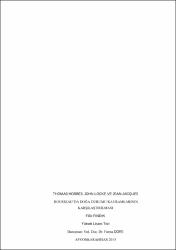| dc.contributor.author | Fındık, Filiz | |
| dc.date.accessioned | 2018-11-27T10:50:36Z | |
| dc.date.available | 2018-11-27T10:50:36Z | |
| dc.date.issued | 2015 | |
| dc.date.submitted | 2015 | |
| dc.identifier.uri | http://hdl.handle.net/11630/4969 | |
| dc.description.abstract | Thomas Hobbes, John Locke ve Jean-Jacques Rousseau siyasal düşüncelerini bir doğa durumu varsayımından hareketle ortaya koymaktadır.
Doğa durumu, siyaset felsefesinde kullanılan bir kavram olarak toplum sözleşmesi öncesinde, yani kurulu bir devlet sistemi olmaksızın insanların içinde bulunduğu düzenin ne olduğu/ne olabileceğine ilişkin sahip olduğu nitelik, hem sözleşmenin yapılış amacının ortaya konulabilmesini sağlaması; hem de sözleşmenin esaslarını ve sözleşme sonrası kurulacak yapının belirlenebilmesi açısından önem arz etmektedir.
En genel hali ile bireylere yaptırım gücü uygulayacak bir üstün otoritenin bulunmadığı durum olarak betimlenen doğa durumunu, Hobbes: herkesin herkesle savaş halinde bulunduğu, sürekli şiddetli ölüm korkusu ve tehlikesi içinde olduğundan dolayı insan hayatının yalnız, yoksul, kötü, vahşî ve kısa süreli olarak tanımlarken; Locke, henüz devletin ortaya çıkmadığı doğa durumunda her bireyin
Tanrı tarafından bahşedilmiş, devredilemez, elden alınamaz nitelikte hakları olduğunu, bunları hayat, özgürlük ve mülkiyet hakları olarak tamamının genel mülkiyet hakları altında toplandığını belirtmiştir. Rousseau ise, doğa durumunu insanın insanı sömürmediği, lüksün ve eşitsizliğin insanın ahlakını bozmadığı bir özgürlük ve eşitlik düzeni olarak tanımlamıştır.
Tez araştırmamızda Hobbes, Locke ve Rousseau’nun doğa durumu algısı temel kavramlar (özgürlük, akıl, ahlak ve sosyalleşme) çerçevesinde açıklanarak, söz konusu filozofların konu hakkındaki düşünceleri karşılaştırılacaktır. | en_US |
| dc.description.abstract | Thomas Hobbes, John Locke and Jean-Jacques Rousseau reveal their political ideas starting from the assumption that the state of nature
State of nature, which is the nature of whatwas the existing orderbefore the social contract, is important to provide ability to reveal the purpose of the creation contract as well as determine the structure to be established after the contract and its terms.
In most general form, a situation in which no superior authority that apply sanction power to individuals is the situation described as
In most general form, a situation in which no superior authority that applies sanction power to individuals is described as state of nature. Hobbes described it as, everyone fight with each other, existence of constant violent fear and danger of
death, human life is lonesome, poor, evil, violent and temporary. Locke mentioned all individuals have right from god that cannot be transferable, taken from him or her and these rights are life, liberty and property when the state had not occurred yet. Rousseau described as equity order that includes no exploitation of man by man, morality of human does not disturb by luxury and inequity.
In this research Hobbes, Locke and Rousseau’s state of nature concepts are explained in the framework of basic concepts (freedom, reason, morality and socializing) and these philosophers’ ideas about subject will be compered. | en_US |
| dc.language.iso | tur | en_US |
| dc.publisher | Afyon Kocatepe Üniversitesi, Sosyal Bilimler Enstitüsü | en_US |
| dc.rights | info:eu-repo/semantics/openAccess | en_US |
| dc.subject | Hobbes | en_US |
| dc.subject | Locke | en_US |
| dc.subject | Rousseau | en_US |
| dc.subject | Doğa Durumu | en_US |
| dc.subject | Toplum Sözleşmesi | en_US |
| dc.title | Thomas Hobbes, John Locke ve Jean-Jacques Rousseau’da doğa durumu kavramlarının karşılaştırılması | en_US |
| dc.title.alternative | Comparison of the state of nature concept onThomas Hobbes, John Locke and Jean-Jacques Rousseau | en_US |
| dc.type | masterThesis | en_US |
| dc.department | Afyon Kocatepe Üniversitesi, Sosyal Bilimler Enstitüsü | en_US |
| dc.relation.publicationcategory | Tez | en_US |



















